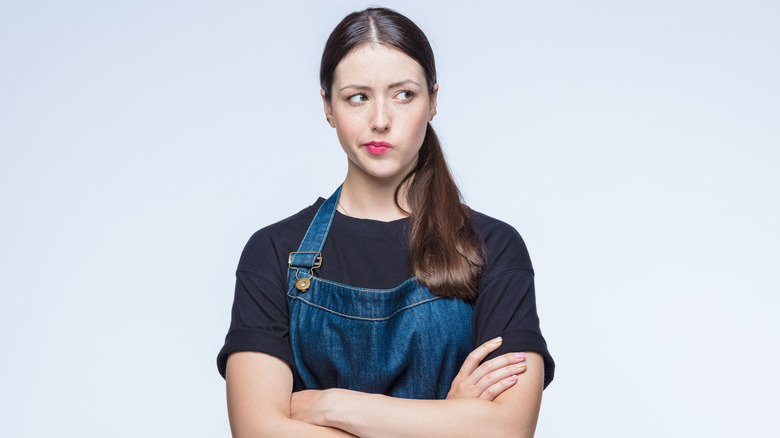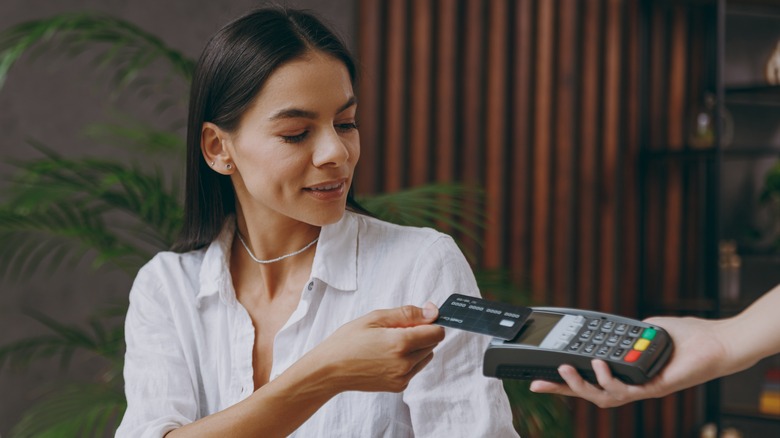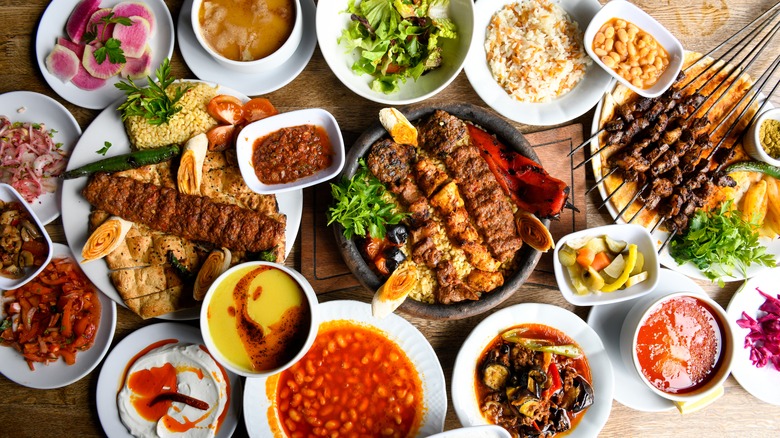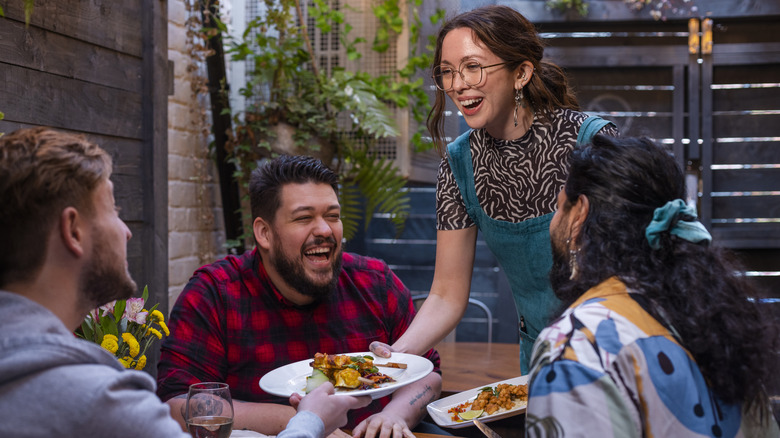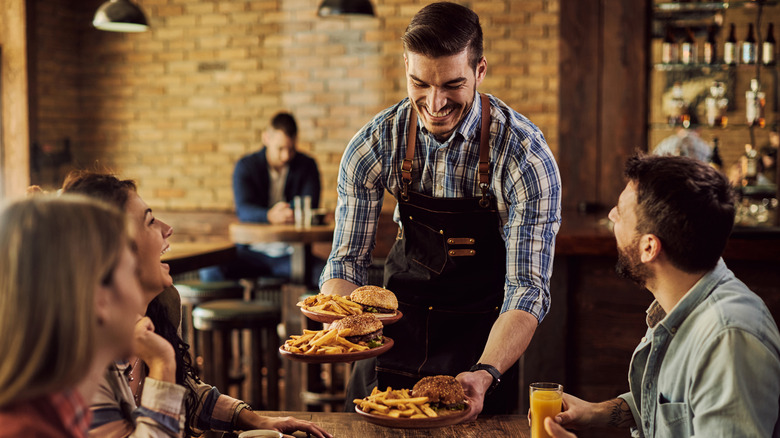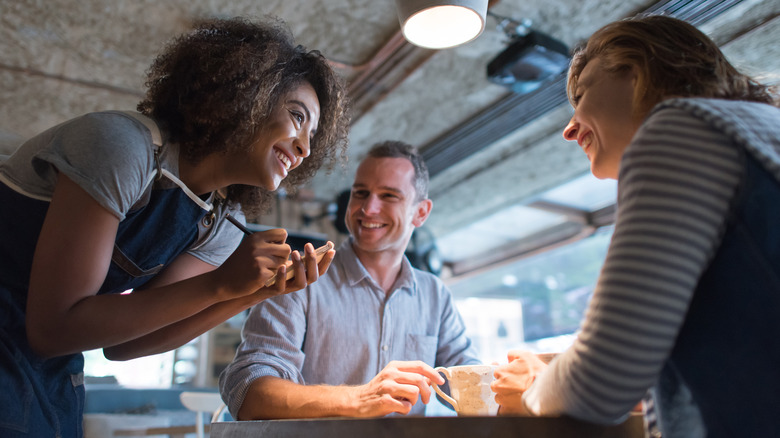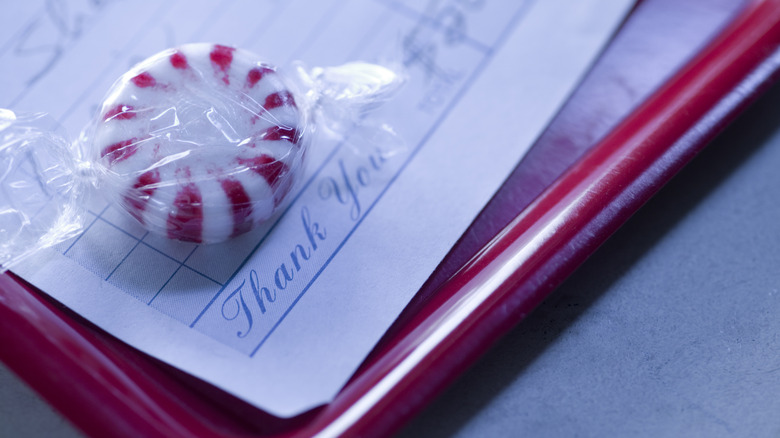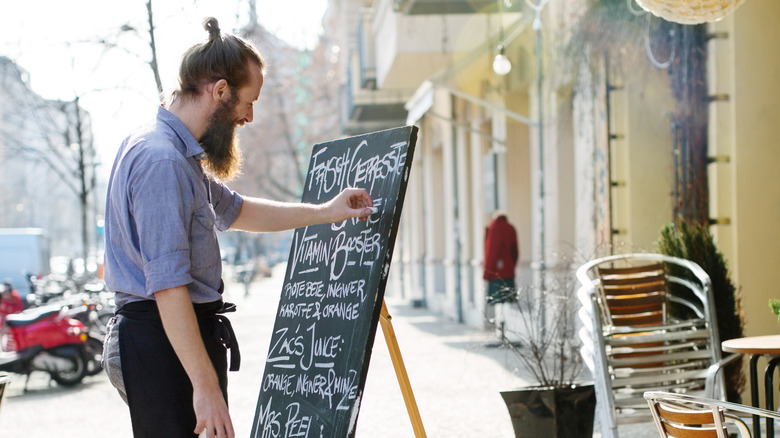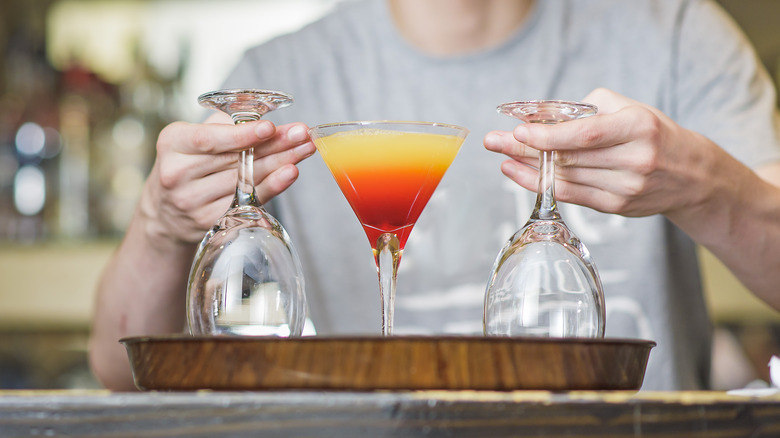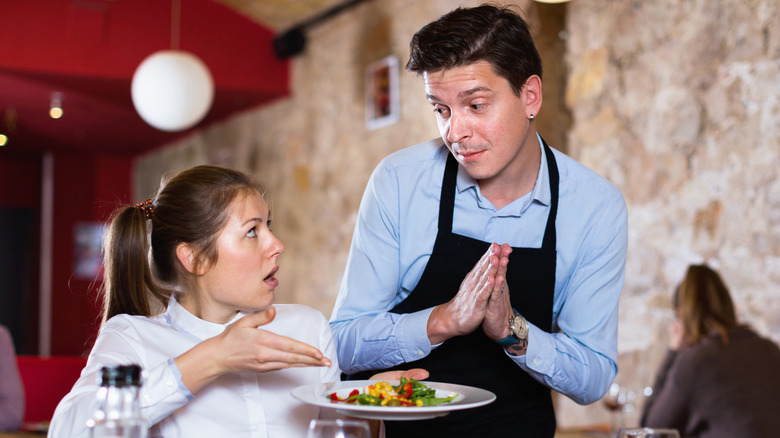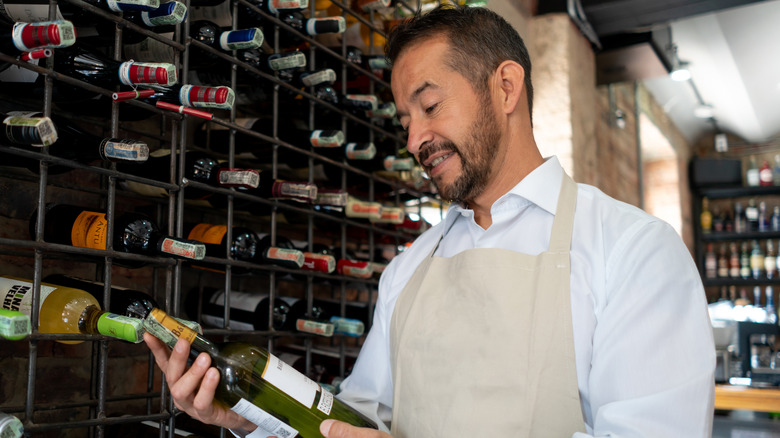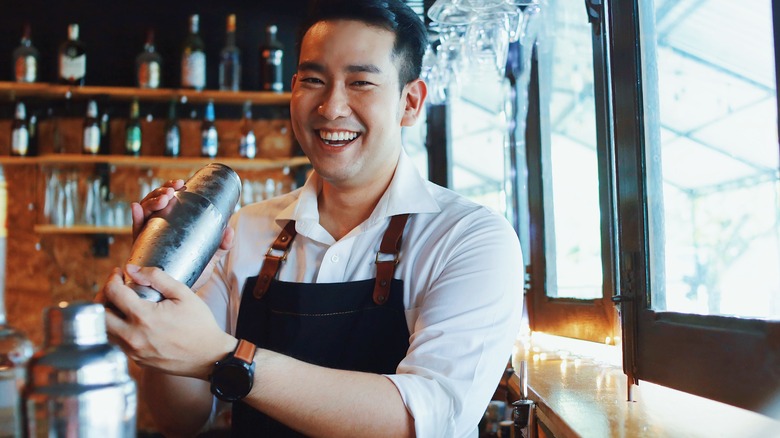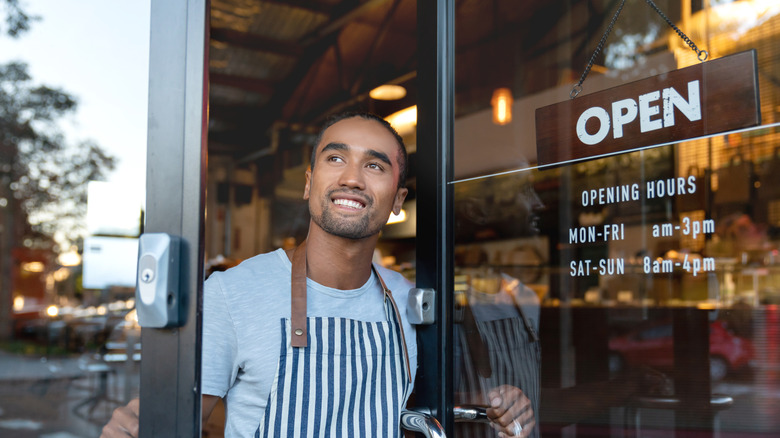Sneaky Ways Your Waiter Might Be Tricking You
While on the surface, a waiter's primary tasks might be taking customer orders and serving food, there is always an additional subtext underlying each aspect of their interactions with diners. And it usually involves money. Whether it be making their employer more money with subtle upselling or earning themselves a higher tip with psychological cues, there are countless tricks waiters can pull that leave you paying more for your meal. They are all quite effective too.
That said, not all of the tricks waiters do are immoral. Instead, they are spread all across the ethical spectrum. You may view some of these tricks as a harmless way for a waiter to do their job optimally, while you may perceive others as full-on emotional manipulation. But making a proper judgment call always requires a larger context. After all, what may look like a personal attempt to swindle you out of more cash may be direct orders from the manager. That's why it is beneficial to focus on both how and why your waiter might be tricking you.
They get you to tip more with digital payments
We've all experienced this one before. You opt to pay for your meal with a card, and the waiter brings a mobile payment system to your table. The device gives you several pre-programmed tip options like 15%, 25%, and 35%. There is also an option for no tip, but you can't tip poorly in front of your waiter. So you reflexively go for the middle option. And like that, you have been tricked by both technology and psychology.
Two different technological factors that led you to tip so generously are outlined by Nir and Far. First, the mobile point-of-sale makes tipping just as easy as not tipping, which reduces the cognitive effort that goes into the act. Second, the device uses the anchoring effect to subliminally guide customers toward the middle tip option. Both of these factors typically result in higher tips.
As for psychological factors, these stem from the waiter's presence during the transaction. They remain right in front of you as you pay, both to help you through any technical issues and to remind you of their service. They also have to stay to print you a receipt. The added pressure that their presence brings is what makes the whole tipping process work so well. Even if you know about this trick, it is genuinely difficult to prolong what could be an instantaneous transaction so that you can press more buttons to calculate a more appropriate tip.
They upsell expensive items and add-ons
On the ethical spectrum, the upsell is considered an honorable duty of the waiter. One online blog encourages all restaurant owners to incorporate the upsell into staff training as a way to increase the average value of each order beyond what the diner had planned to spend (via TableCheck). And many restaurants comply. But this doesn't preclude the upsell from being used as a trick by cunning waiters and restaurant managers.
The ethics of upselling become dubious when waiters are trained or encouraged to suggest the most expensive menu items. In a similar vein, some waiters might characterize fancy toppings or pricey drinks as "must-try" add-ons simply to boost their average ticket price. Worse yet, they might ask you if you want a refill without telling you that it costs extra. It is when the suggestions start to feel distinctly transactional that upselling starts to shift from a genuinely helpful prompt to more of a brazen cash grab. And knowing how to spot the difference will save you a surprising amount of money in the long run.
They connect with you personally
When a waiter takes the time to make a personal connection with a table of customers, it is often seen as an indicator that they are doing their job dutifully. After all, hospitality is just another service that many businesses provide. But compared to a grocery store clerk or a department store employee, waiters are far more heavily incentivized to give that personal touch to each interaction. And so some tend to lay the hospitality on a little thicker than those in other customer service jobs. Sometimes, these personal touches can feel forced.
Common techniques for manufacturing a personal connection include lightly touching a diner's arm, paying a compliment, or even squatting down to make better eye contact (via The Center for Hospitality Research). Another common method is writing "thank you" or drawing a smiley face on the bill. Whatever tool your waiters use, their goal is always to build rapport throughout the meal in hopes of earning a higher tip. And this usually makes for a more enjoyable meal for the customer. That is until said customer waves at the waiter walking down the street the next day only to find that they no longer even recognize them.
They make themselves more personable
If your waiter doesn't think they can get you to spend more by showing interest in you, then an alternative approach they may take is to make you interested in them. By showing a little of their own personality, they appeal to your humanity in hopes of getting of a bigger tip. For example, waiters who introduce themselves by name see a tip rate of 23% compared to a rate of only 15% when they don't, according to a 1990 study in the Journal of Applied Social Psychology. In addition, they might wear an expressive piece of clothing like a hair clip or a decorative button. Or perhaps they share with you an intimate detail about their day.
For the most part, this is a fairly innocuous trick, especially when it comes from a genuine desire for self-expression. However, it can take on a more devious form when waiters fabricate details about their life or someone else's to illicit sympathy. For example, one viral TikTok user who forgot to put in an order claims he got a big tip after lying and saying the waitress with their food fell and had to be rushed to the hospital (via New York Post). Clearly, this type of misanthropic behavior should not be expected of every waiter, but apparently, there are people out there who are willing to go there.
They parrot your actions, speech, and mannerisms
Oscar Wilde once said, "Imitation is the sincerest form of flattery." And in the case of waiting tables, flattery is an easy way to get bigger tips. That's why waiters so frequently parrot the actions, speech, and mannerisms of their patrons. This form of mimicry is so potent to the human psyche that it actually occurs unconsciously in a phenomenon called the chameleon effect, according to a 1999 study in the Journal of Personality and Social Psychology. Of course, the type of parroting done by waiters goes far beyond the subtle posture-matching of the chameleon effect.
Mimicry is such an effective form of social interaction that it has become an ingrained part of the food ordering process. Today it is commonplace for waiters to be trained to repeat back customers' orders. One source suggests that waiters use the exact same words as their patrons when possible so as to build an even more intimate bond (via ChangingMinds.org). Not only does this practice demonstrate the waiter's understanding of what their customer wants, but it also translates to an average increase of 68% in their tips, according to a 2003 study in the Journal of Experimental Social Psychology. Whether or not intentional mimicry is manipulative may warrant future discussion, but there is no doubt that it has an established place in the competent waiter's playbook.
They bring you an extra treat with the bill
From peppermint candies to chocolate morsels to fortune cookies, the practice of waiters bringing you an extra treat with the bill has become nearly ubiquitous. But what you may not know is that this behavior has been confirmed through scientific rigor to increase restaurant tipping. Individuals participating in a 2002 Cornell University study tipped nearly 18% on average when given a treat with the bill compared with the control group, who received no treat and tipped 15% on average, according to the study published in the Journal of Applied Social Psychology. Curiously, this change becomes even more drastic when participants receive more than one treat. This is the part where your waiter could be tricking you.
As the study further reveals, participants who received two pieces of candy tipped even higher. Participants who received one candy and then a second one momentarily after that tipped higher yet. Now imagine what happens when the waiter brings a whole piece of cake that was supposedly about to go to waste. Or when they mention they removed an item from the bill that was late to come out. The reciprocity principle can potentially be abused in these subtle ways, and most savvy waiters know about this as well.
They push specials to clear out old inventory
While most restaurants use daily specials to experiment and make dishes with seasonal ingredients, these off-the-menu meals can sometimes serve more insidious purposes. According to corporate chef Daniel England of Union Kitchen & Tap in California, one of the main reasons that restaurants have specials is to use up ingredients that they over-ordered (via Reader's Digest). An honest restaurant would do this before the ingredients reach their expiration date, but a dishonest one might not be so proactive. This means serving expired or near-expired ingredients to unwitting customers.
Most of the time, your waiters are complicit in all of this too. Since it is their job to steer the dining decisions of customers, they are usually told by their manager to push a stale special. Some may give it a false endorsement by saying they tried it and loved it. Others will create a sense of scarcity by mentioning that they are almost out of the special. The most frustrating part about this trick is that there is no easy way to tell if the waiter's recommendation is genuine or bogus. Instead, you have to make the call based on the type of restaurant at which you are eating. Either way, it would be a mistake to unilaterally trust all waiters when they say that the special is good.
They walk around with colorful drinks
If you're anything like the average restaurant-goer, you probably take a look around the room to see what other people are eating or drinking before you order for yourself. That's why it is common for waiters looking to add some drinks to their diners' tabs to make up one of their most expensive and flashy cocktails and just walk around with it. A former waiter at Sheraton Hotels & Resorts has attested to this tactic, saying one of their managers reported an 80% success rate in getting customers to order said drink (via Quora).
The reason this works is because of the phenomenon of social influence, wherein individuals are prone to change their behavior to meet the demands of a social environment. Combine that with the visual allure of a brightly colored cocktail, and you've got the perfect storm of subliminal suggestion. This doesn't mean that you should feel duped when you order whatever catches your eye, but knowing why you want it allows you to make a more informed decision.
They pretend to be new to get sympathy
Whenever a mistake happens in a restaurant, the onus usually falls on the waiter to answer for it. Whether the kitchen makes a mistake or the manager understaffed the floor on a Friday night, it is always the waiters who have to apologize. Sure, they could pass the buck, but that doesn't necessarily save them from a mediocre tip. So instead, some waiters may lie and pretend that they are new to garner some sympathy from the table.
One Reddit user confessed to having done this in the past. They added, "The manager who trained me told us this and even encouraged us to keep doing it for as long as we wanted. She had one girl who did it for 2 1/2 years." So not only do some waiters pretend to be new, but some managers teach their staff to do so. This trick does require the waiter to be fairly confident that repeat customers don't recognize them, though, so it is not quite as common as other tip-boosting techniques.
They pretend to be an expert to get praise
While a truly excellent waiter will know their kitchen's menu up and down, plenty of folks out there are just faking it until they make it. That is why you can't always trust that your waiter has tried any specific dish you ask about, let alone the entire menu. "Waiter speak" reveals some of the codified language that some staff may use to signal to you that they actually don't know what they are talking about, according to a post in The Restaurant Manifesto. For example, if a waiter says, "It's a pretty dry, full-bodied wine," then what that probably means is, "I've never tasted it." In other words, look for generic language as a sign that your waiter has not actually tried something.
This sort of trickery isn't universally practiced, though. There are plenty of restaurants that offer their hard-working employees free meals from the menu specifically so they can learn all of the plates. It all depends on the kind of restaurant and the person running it. Either way, it doesn't hurt to take any dish suggestions with a healthy grain of salt.
They try to get you to drink more alcohol
While restaurants that serve alcohol don't necessarily want patrons to get rowdy drunk, they definitely want every one of drinking age to order a drink. Preferably, they want you to order two drinks. The main reason is that drunk customers typically spend more money on food and beverages. This fact was affirmed by an industry veteran on Quora, who claims, "Some people get food cravings when they drink (I certainly do). So a drunk customer is more likely to order some greasy bar snack."
The most common trick that waiters and bartenders pull is ignoring over-serving laws. Many waiters won't hesitate to serve another drink to a visibly intoxicated customer, as it usually means their tip will be based on a higher bill. They might also add two straws to your drink to get you to drink it faster. Again, this is only common in certain types of establishments, though. A classic restaurant would not likely put its family-friendly reputation at risk by letting customers get sloppy, but a dive bar might. Regardless of the types of restaurants you frequent, this is still a practice to be aware of.
They only talk about the weather when it's good
At the risk of stating the obvious, it is a waiter's job to act friendly and hospitable to customers. And while this is fairly common knowledge, it doesn't stop many restaurant patrons from tipping higher in response to certain friendly gestures from their server. For example, an experienced waiter will only talk about the weather when the forecast is good. This gesture is proven to put people in a good mood, priming them to tip more when the time comes to pay their bills (via The Center for Hospitality Research).
And then there's smiling. There's nothing weird about being greeted by a waiter wearing an ear-to-ear grin until you've walked a mile in their shoes and realized that they are probably dead inside. Smiling is one of the most well-documented ways for waiters to improve tips, but shrewd customers can easily detect a fake smile, so it has to be a good one. If you spot a waiter wearing a fake smile in the wild, though, you would be wise not to peel at the edges of their facade. That smile is protecting you from the demanding reality of their job just as much as it is protecting you.
